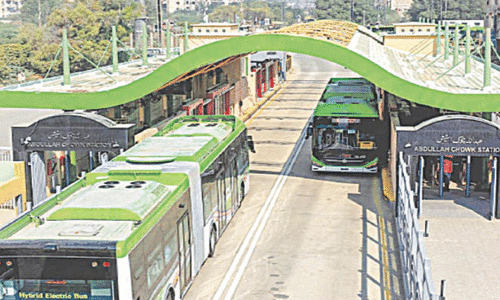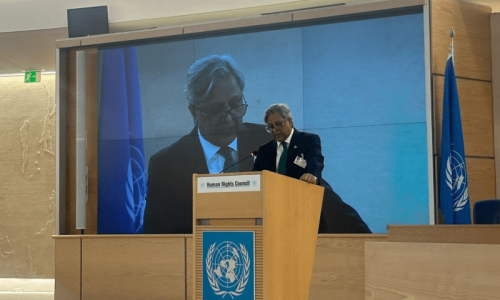KARACHI, Oct 18: Speakers at a meeting on Saturday stressed that an effective monitoring mechanism of public-private partnership be integrated into the proposed national migration policy so that it could deliver the desired results.
Speaking at the first provincial consultative meeting held in the city on ‘Draft national migration policy – promoting migration and protecting migrants’, prepared by the Policy Planning Cell of the federal labour ministry, they said that while many good policies had been formulated by the governments in the past also, a majority of them had failed to deliver owing to the faulty implementation process.
Such consultative meetings, as being organised jointly by the International Labour Organisations and the federal labour ministry, would be held in Lahore on Oct 23, in Peshawar on Oct 25 and in Quetta on Oct 30.
Workers Employers Bilateral Council of Pakistan (WEBCOP) chief Ahsanullah Khan, who presided over the meeting, suggested that skill-development centres of international level be developed where workers intending to go overseas could get country- as well as trade-specific trainings so that not only they were aware of local requirements relating to the specific trades but also knew how to work in a multicultural work environment.
He also urged the authorities to ensure that the rights of migrant workers were protected. He regretted that while a few of the brotherly countries in the Gulf made tall claims of following the religion, they exploited workers many of whom lived in subhuman conditions there.
He said that though it was primarily a duty of the government, the WEBCOP, also managing many skill development institutes here, was planning to organise road shows in foreign countries in the Far East as well as in the Gulf to market the highly trained human resource available in the country. He said a majority of the overseas Pakistani workers were unskilled, and efforts be made to export highly skilled and qualified people to work there.
He also gave an example of a highly industrialised Far Eastern country where a large number of Pakistanis were working but they were not given the status of workers and they worked as “illegal workers” because if they were given the legal status, they would be entitled to rights and benefits. He stressed that the government should take concrete steps so that rights of Pakistani workers abroad were protected.
Earlier, the cell chief, Dr Sabur Ghayur, said the Gulf region was a single largest region where the Pakistani were employed, with the largest number being in Saudi Arabia (1.2 million Pakistanis), followed by the UAE (750,000 Pakistanis) and others. He said the involvement of some Pakistanis in drug trafficking and entry on forged documents had seriously affected the country’s reputation. He said the Kuwaiti government had imposed restrictions on Pakistani workers, which were later lifted, but the negative image persisted there. Similarly, there was a trend among Pakistani workers to enter Europe through Libya, which needed to be discouraged. He said the policy also suggested the establishment of a task force to study the workforce requirements of particular countries.
He said research had shown that a large number of middlemen/ subagents working between the worker and government agencies enhanced the cost of the workers, so under the new policy their role would be minimised if not eliminated.
He said the policy also proposed establishing of at least five special courts – one each in Islamabad, Lahore, Karachi, Quetta and Peshawar – for speedy processing of complaints and to promote safe and regular migration. He said the policy prescribed that steps be taken to look into problems and prospects of overseas migration of women workers.
Earlier, ILO representative Margret Reade Round said that the migrant workers were an asset to every country where they worked. So it was important their rights were protected. The native countries of the workers should also take steps to ensure that their migrant workers’ rights were protected in other countries as well as in their own country.
Zia Awan, a rights activist, speaking on the issue of health of migrant workers said that when those workers went overseas to work, they underwent comprehensive medical tests before flying out, but when after some time some of them were detected to be infected with the HIV / AIDS virus, they were deported. He stressed that these countries should take the social corporate responsibility and rather than sending them back should take care of those workers infected with the disease while working there.
Mushtaq Ahmad suggested that evening shifts in Pakistani embassies be introduced as a majority of the workers, owing to their jobs, could not come to the embassies during office hours.
Labour leader Khalil Ahmad said that a large number of the community welfare attaches, commonly known as labour attaches, in the embassies were posted either on political contacts or their personal contacts, whereas this being a specialised job, only professional people be posted there.
Hakim Ali Shah Bokhari, Ghayur-ul-Hassan, Tariq Shamim, Shaukat Ali, Dr Nasir and others also spoke.












































